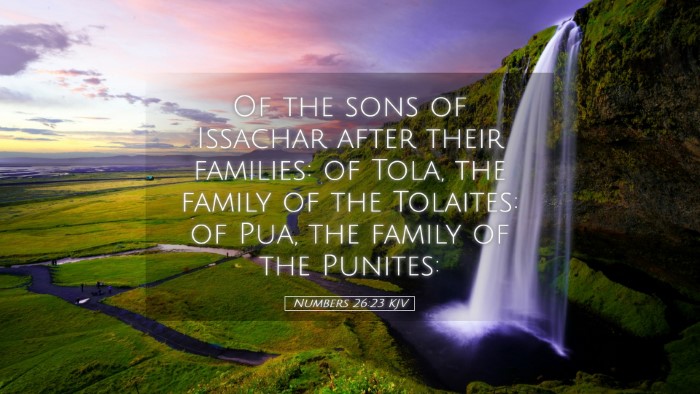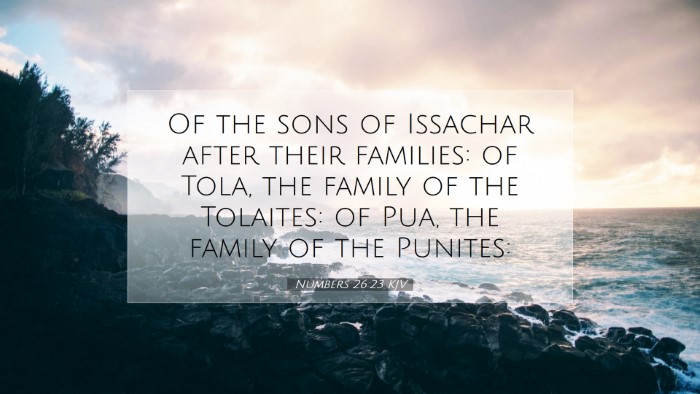Commentary on Numbers 26:23
Numbers 26:23 reads: "The sons of Jacob after their families: of Naphtali, the families of Jahzeel, and the family of Guni," This verse is a part of the larger context of the census taken of the Israelites as they prepared to enter the Promised Land. It is significant in its historical and theological implications.
Historical Context
The book of Numbers records the journey of the Israelites from Mount Sinai to the plains of Moab, near the Promised Land. The census in this chapter serves a dual purpose: it reaffirms God’s promises to the Israelites regarding land and family inheritance and emphasizes the importance of order and structure within the Israelite community.
Commentary Insights
Matthew Henry's Commentary
Matthew Henry notes that this verse represents a significant turning point for the Israelites. He emphasizes that this census is not just a mere counting of the people but is reflective of God’s faithfulness to His promises. The mention of families signifies the importance of community and God’s covenantal relationship with His people. Henry draws attention to the fact that each family had its own designated land, illustrating that God remembers each tribe and individual.
Albert Barnes' Commentary
Albert Barnes expounds on the families of Naphtali, emphasizing the distinctiveness of each tribe. He points out that Naphtali, a son of Jacob, represents a group with unique characteristics and contributions to the Israelite community. Barnes explains that the families listed from Naphtali are indicative of the intricate social structure of the Israelites. Moreover, he elaborates on the significance of names within the Old Testament, suggesting that each name carries weight in terms of history and legacy. This naming also serves to document the fulfillment of God’s promise to Abraham that his descendants would be numerous.
Adam Clarke's Commentary
Adam Clarke provides a detailed analysis of the families of Naphtali. He interprets the names mentioned as reflecting the spiritual state of the Israelite tribes during their wilderness journey. Clarke notes that understanding these family dynamics can give insights into the broader thematic elements of unity and division within the Israelites. He highlights that these families had their unique characteristics and divine roles, assigned by God Himself. Clarke's analysis shows an understanding of how these families fit into the overall narrative of the Israelites preparing for the future ahead of them in the Promised Land.
Theological Insights
This verse underscores several key theological principles important for pastors and theologians:
- Covenant Faithfulness: The counting of the tribes serves as a reminder that God fulfills His covenant promises. The fact that the names of each tribe are recorded emphasizes God's personal relationship with each tribe and person.
- Community and Identity: The families represent not just a census but the individual identities woven together into a community called to worship and serve God.
- Preparation for the Future: This preparation reflects the realities of leadership, order, and the divine plan as the Israelites stand on the brink of entering the Promised Land.
- Ancestry and Heritage: The names and their meanings can provide insights into the heritage of each tribe, reminding current readers about the importance of understanding one’s own spiritual ancestry.
Practical Applications
The implications of Numbers 26:23 are far-reaching for today's church and community:
- Emphasizing the Importance of Community: Just as the Israelites had distinct identities yet formed one nation, modern congregations should celebrate diversity while fostering unity in Christ.
- Encouraging Faith in God’s Promises: This passage serves as a reminder to trust in God’s faithfulness even when circumstances are uncertain.
- Teaching on Heritage and Ancestry: Understanding our spiritual heritage can inspire believers to carry forward the legacy of faith laid down by previous generations.
- Creating Order in Leadership: The structure seen in the census can be mirrored in church governance, promoting clarity and responsibility in leadership roles.
Conclusion
The examination of Numbers 26:23 through these public domain commentaries reveals profound insights relevant for believers today. The verse not only recounts a historical census but also serves as a rich source for understanding God’s covenantal faithfulness, the importance of community identity, and the preparation for future endeavors. As pastors, students, and scholars engage with this scripture, they are encouraged to draw upon the themes of unity, faith, and God’s meticulous care for His people as they navigate their own paths of service and worship.


